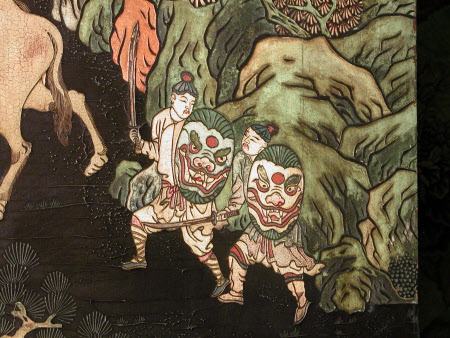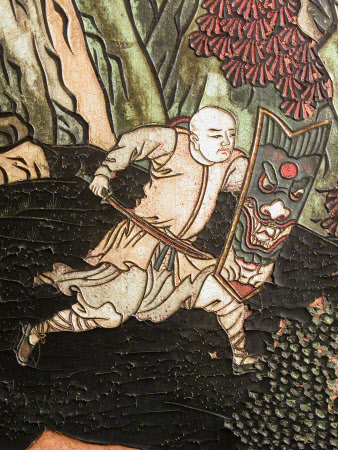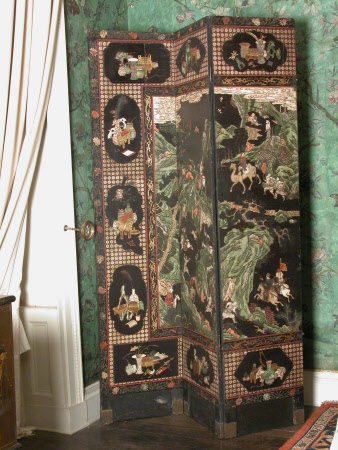Folding screen
Category
Furniture
Date
circa 1675
Materials
Wooden substrate, coromandel lacquer, iron, metal
Measurements
Each panel 223.5cm high x 50.8cm wide x 1.8cm deep; overall 152.4cm wide
Place of origin
Jingdezhen
Order this imageCollection
Erddig, Wrexham
NT 1147113.1
Summary
Three leaves, or half, of a six-panel 'coromandel' lacquer screen, Chinese Export, late 17th century. With iron hinges and sheet metal clasps to the bottom edge, probably replacing feet, now lost. The centre front of the screen decorated with an incised polychrome lacquer scene of travellers, hunters and soldiers on horseback in a mountainous riverscape beneath a cloudy sky. Within an inner border of foliated scrolls. The wide border with shaped reserves of utensils and vases of flowers against a trellis-type background. All within a narrow outer border of flowers of alternating colours. The reverse with shaped panels filled with travellers, sages, birds, horses and gardens within similar trellised surrounds.
Full description
Screens like this, of incised lacquer, were made for export in China, but have acquired the name 'Coromandel' lacquer because they were shipped to Europe via Indian ports. It is said that this screen is the one mentioned in a letter written by Elihu Yale (1649-1721) in a letter to Joshua Edisbury (d. 1718) of Erddig in 1682, in which he promised - in return for 74 gallons of ale which Edisbury had already sent - a 'japanned screen' and some mango preserves. His relationship with Edisbury, to whom he had loaned money, was soured when he called in the loan, encumbered by crippling interest. Edisbury, in terrible financial straits already, was declared bankrupt in 1709 and forced to sell Erddig. Elihu Yale - heavily involved in the founding of Yale University, which took his name - was born in New England in America. He returned to England when he was three, becoming a clerk of the East India Company, eventually becoming the Governor of Madras. In 1699, Elihu inherited Plas Grono, and returned to England leaving an illegitimate child behind in India. After his death, it took forty days to disperse his huge collection of art and curiosities at auction. Amongst the lots were over 5,000 paintings and 'a fine India Skreen standing upwards of ten foot'. His epitaph read: 'Born in America in Europe bred In Africa travell'd and in Asia wed Where long he liv'd and thriv'd; In London dead' He has been linked to the trade in enslaved people during his time in the East India Company, leading to claims that Yale University was founded on the proceeds of the slave trade since, in 1718, Yale sent goods to support the Collegiate School of Connecticut, who renamed their main building in his honour. Two paintings of Elihu Yale also include black attendants wearing metal collars, indicative of their enslavement. On his return to England, Yale was also a member of the Society of the Propagation of the Gospel in Foreign Parts, a London-based religious group which aimed to evangelise British colonies, and which owned slaves: James Heywood Markland, Treasurer to the Society at the time that slavery was abolished was awarded compensation of £8,558 for the 410 slaves that the Society owned on the Codrington estate in Barbados. Others have argued that Elihu Yale is not known to have owned slaves himself and is said, in fact, to have opposed aspects of the trade in Indian slaves during his time as Governor of Madras.
Provenance
Reputedly the gift of Elihu Yale (1649-1721) of Plas Grono to Joshua Edisbury (d. 1718) of Erddig or his wife, Grace Delves (d. 1680), in 1682. Not listed in the inventory taken at Erddig in 1726. Given by Philip Yorke III (1905-1978) along with the estate, house and contents to the National Trust in 1973.



